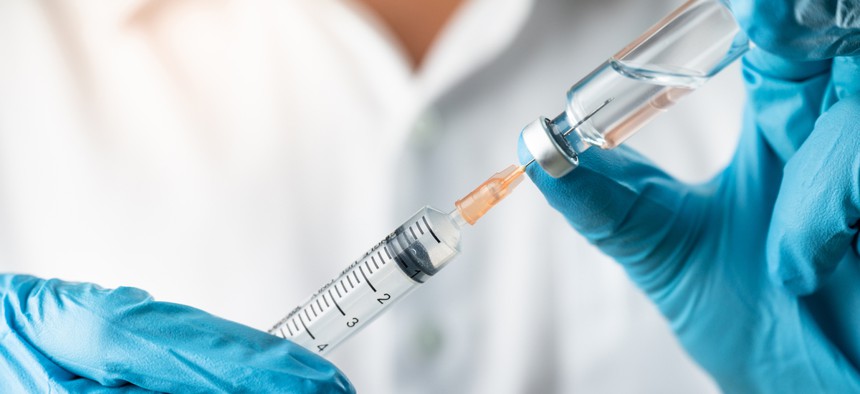It Could Be Hard to Get Compensated for Injuries Related to the Coronavirus Vaccine

There is a race to develop a vaccine for the coronavirus. Shutterstock
With drugmakers shielded from most liability in court and injury claims routed to a rarely-used federal compensation program, experts are raising concerns about whether there will be sufficient relief available for vaccine-related injuries.
Injuries, serious side effects, and death from vaccines are extremely rare; about 1 person in every million suffers an injury serious enough to warrant compensation. But as coronavirus vaccines are being developed at an unprecedented speed, some health experts say there needs to be a clear path to compensation for anyone who suffers an adverse reaction to a vaccine—especially for those who will be first in line to be vaccinated, like healthcare workers.
If a drug company does rush a vaccine to market that ends up harming some people who receive it, they will be shielded from most legal liability thanks to steps taken by the Trump administration in recent months. Rule changes ensure that drug manufacturers can only be sued for death or serious physical injuries caused by vaccines in the event of “willful misconduct”—a high bar that will be hard for most petitioners to overcome.
Michelle Mello, a professor at Stanford Law School who has written about medical liability and vaccines, said that some liability protection for vaccine makers is expected during a time of crisis. “It is pretty common to add vaccines that public health officials really want people to get, but that have known side effects or are novel enough that makers are skittish about liability,” she said.
Usually, those who sustain injuries due to vaccines can apply for compensation through the National Vaccine Injury Compensation Program, which dispenses money when people experience adverse effects of routinely administered vaccines, such as those required for most school-age children like polio and the measles, as well as the seasonal flu vaccine. This type of system, Mello said, can be easier than the alternative of suing vaccine manufacturers in court. It’s “better for patients because they don't have to prove causation, if their injury is on the list of known adverse effects, and better for manufacturers because they don't face liability risk,” she said.
But the Vaccine Injury Compensation Program won’t be available for those who sustain injuries from a coronavirus vaccine. A Trump administration rule from early in the pandemic bars those injured by a Covid-19 vaccine from accessing the VICP.
Those who are injured or die from a coronavirus vaccine can instead seek compensation through the rarely-used Countermeasures Injury Compensation Program, a fund run by the U.S. Department of Health and Human Services. But, unlike the VICP, the CICP requires people to pay for their own legal fees when bringing a claim and does not allow claimants to recoup those fees even if they are successful in getting an award. Pain and suffering also aren’t covered under the CICP, with claims generally limited to medical costs for physical injuries that warrant hospitalization or led to a significant loss of function or disability.
Another major concern with the CICP is its track record. One vaccine specialist told Reuters that the process was a “black hole” handled by HHS outside the court system—meaning there are no expert witnesses, hearings, or appeals. Of the 485 claims filed with the CICP since 2010, only 39 people have received compensation totaling $5.7 million, almost all of them for H1N1 flu vaccines.
HHS did not respond to a request for comment about what impact changes to the vaccine compensation system may have on those who are injured by a coronavirus vaccine.
Some experts want the VICP to handle coronavirus claims, saying the system is better prepared to deal with a potentially large volume of claims. The VICP has paid an average of 615 claimants each year since 2015 at the rate of about $216 million annually. In addition to a higher payout rate at around 75% of claims, the VICP also has a much more public process with rulings and appeals run through the federal court system.
Another advantage of the VICP is its funding. The VICP has a guaranteed source of revenue obtained through a tax on vaccines. The CICP, by contrast, relies on Congressional appropriations. Recent federal laws related to the pandemic provided funding to HHS for fighting the coronavirus, but while these funds are allowed to “be transferred to, and merged with” the CICP, there’s no guarantee that’s where they’ll end up. HHS hasn’t received any Covid-19 injury claims yet, and no money has been routed to CICP so far.
Richard Topping, a former Justice Department lawyer who represented the Secretary of Health and Human Services in cases involving childhood vaccines, told Bloomberg that the potential volume of people negatively affected by a coronavirus vaccine could “be too much for some unfunded compensation program.”
“In the best case scenario, this is going to be a big deal,” he said. “Worst case scenario? It will be a crisis.”
Emma Coleman is the assistant editor for Route Fifty.
NEXT STORY: Why Black Aging Matters, Too






